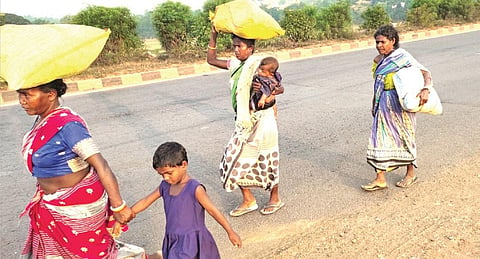'More relief measures required for migrant workers'
NEW DELHI: The Centre’s relief packages announced for migrant workers were inadequate and would face implementation challenges, said experts.
This comes after Finance Minister Nirmala Sitharaman announcement that the Centre’s focus would be on migrant workers, street vendors, small traders, small farmers, and self-employed people.
The government’s ‘One Nation, one Ration’ scheme will have operational challenges at the ground, experts said. With states being strapped on cash, the sum of Rs 11,000 crore given to states for migrant workers would fall short in grappling with the scale of the humanitarian distress that has unfolded amid the lockdown, they added.
“The only announcement of any significance is free rations for two months for migrant workers. This is a period when we need universal free PDS for three months for the entire population. This is a marginally positive measure,” said Jawaharlal Nehru University professor Jayati Ghosh. This step should have come earlier, she added.
There was no announcement from the government on extending MNREGA days or extending it to all workers and not just households. “It is still 100 days per household. What is also really shocking is there is nothing enabling migrants to return...All of these would have been expected of a minimally empathetic government,” said Ghosh.
The government announced it would launch a scheme for affordable rental housing for migrant workers and urban poor to provide ease of living by converting government-funded housing in cities into Affordable Rental Housing Complexes (ARHC). This would be carried out through PPP mode.
Ashok Khandelwal, national advisor, National Struggle Committee of Brick Kiln Workers said the announcement largely left out a significant number of brick kiln workers and sugarcane cutters who have poor housing conditions. “They migrate from one rural area to another. Plus, all migrant workers should be given housing near their place of work,” he said.
In the government’s second stimulus tranche, it did not address the loss of livelihood of migrant workers in cities, pointed out Nivedita Jayaram, researcher, Ajeevika Bureau -- an NGO working with migrant communities.
“The lockdown has meant non-payment of wages and non-availability of work for workers. Most of the migrant workers are casual or daily wage labourers. They do not have basic work contracts, and no employer to demand wages from. The government needs to address this through cash transfer schemes,” said Jayaram.
The provisions of 5kg wheat/rice per person and 1 kg chana per family for a month for the next two months for non-card holders was inadequate, experts observed.

